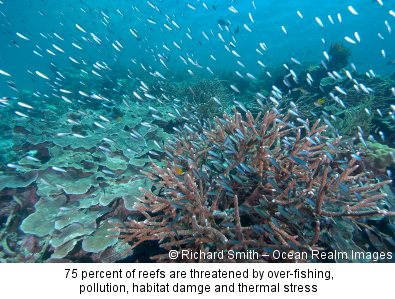This week a major new report, three years in the making, on the current status of the world’s coral reefs called Reefs at Risk Revisited has been published. The report found that 75% of the world’s coral reefs are threatened by local threats such as overfishing, pollution and coastal development as well as thermal stress. Over-fishing and destructive fishing were found to be the most prominent immediate threat affecting more than 55% of reefs, especially in Southeast Asia.
The percentage of reefs at risk has increased by 30% in the 10 years since the original report Reefs at Risk was published and the threat from overfishing and destructive fishing practices has increased by a staggering 80% in 10 years, most significantly in the Pacific and Indian Ocean regions.
Even more concerning than these revelations is the prediction that in just another 20 years 90% of the world’s coral reefs will be threatened, with the global change in climate and ocean acidification also contributing to the threat to coral reefs. Clearly urgent action needs to be taken now to prevent this prediction becoming a reality.
EDGE Coral reefs is already highlighting the need for conservation through the selection of 10 focal EDGE coral species that will act as flagships for the regions and habitats in which they are found. EDGE will initiate conservation for these focal species in the regions in which they occur through the EDGE Fellows programme which supports early career conservationists to carry out research or conservation on top-priority EDGE species.
A training course for EDGE Coral reef Fellows is currently in development with the first course expected to happen this year in the Philippines. In Southeast Asia 95% of coral reefs are threatened, with the Philippines second only to Indonesia which has the largest area of threatened reefs. The people of the Philippines are heavily reliant on their local coral reefs for goods and services and there is a real need to build the skills and knowledge of local people to enable them to effectively protect their own reefs resources. The EDGE Fellows training programme will increase conservation capacity in this region and help provide local people with the skills and tools they require to conserve their local coral reefs.
The EDGE Coral reefs conservation programme is also developing projects in the West Indian Ocean and the Caribbean to help train and support up-coming national coral reef conservationists in threatened regions across the world.
You can help the development of the EDGE Coral reefs training programme by supporting EDGE here.
As an individual you can also help the conservation of coral reefs with the following actions.
- Reduce your carbon emission to help reduce carbon dioxide levels in the atmosphere which contribute to the global change in climate and ocean acidification.
- Vote for politicians that support environmental policies
- Support organisations that make the environment a priority or are working towards conserving the environment
- Choose fish, seafood and marine products that are sustainably sourced
- When visiting coral reefs choose eco-conscious tour operators or diving companies and avoid physically damaging the reef.
To read the full report visit the World Resources Institute website, who along with the Nature Conservancy, the WorldFish Center, ICRAN, UNEP-WCMC and GCRMN as well as many other governmental, NGOs, researchers and universities produced Reefs at Risk Revisited.

